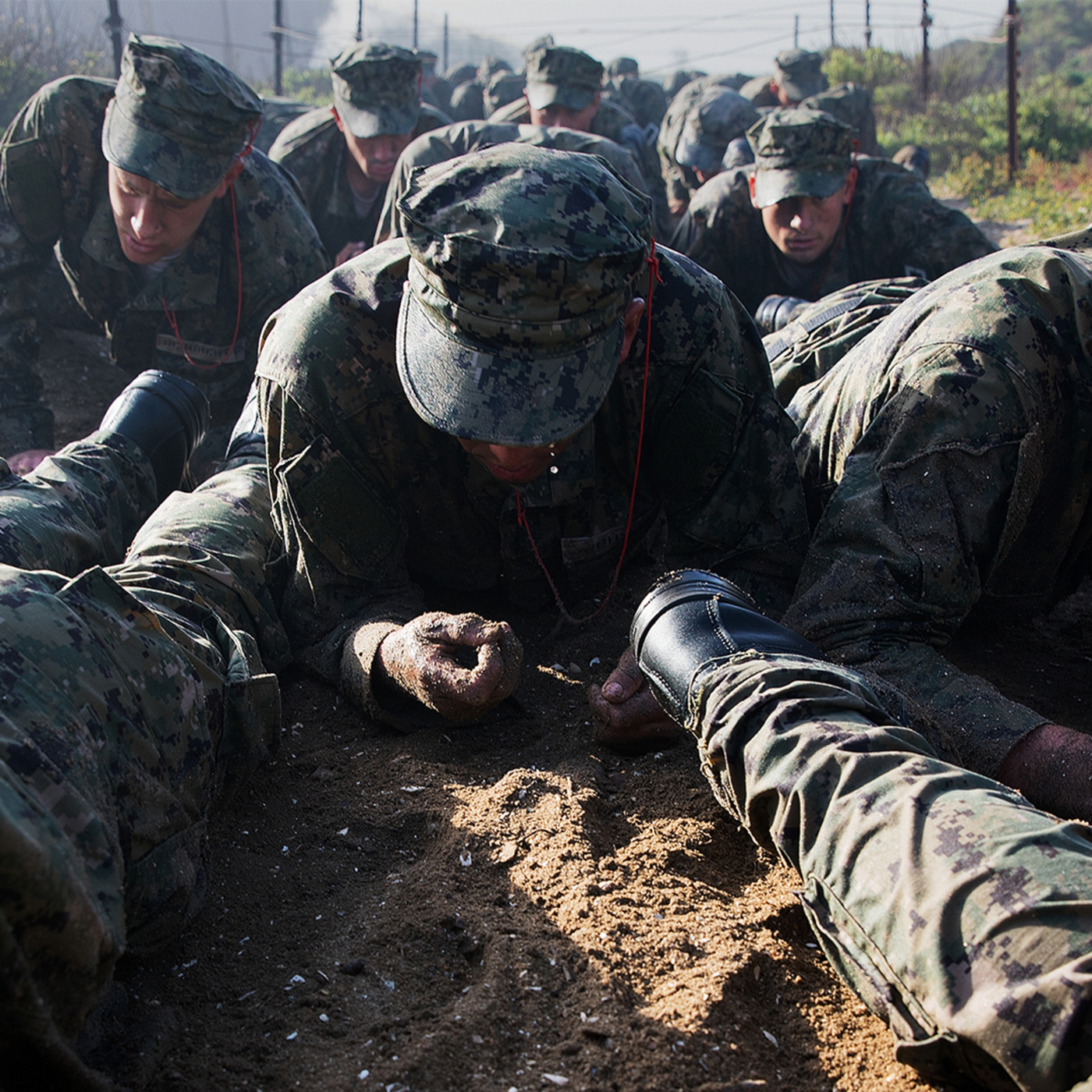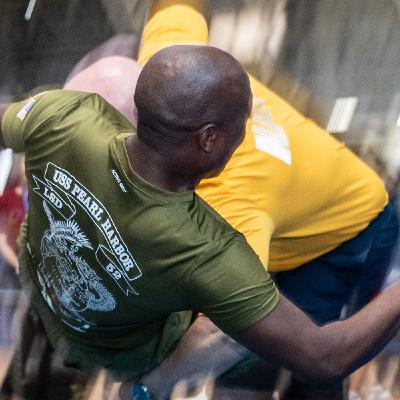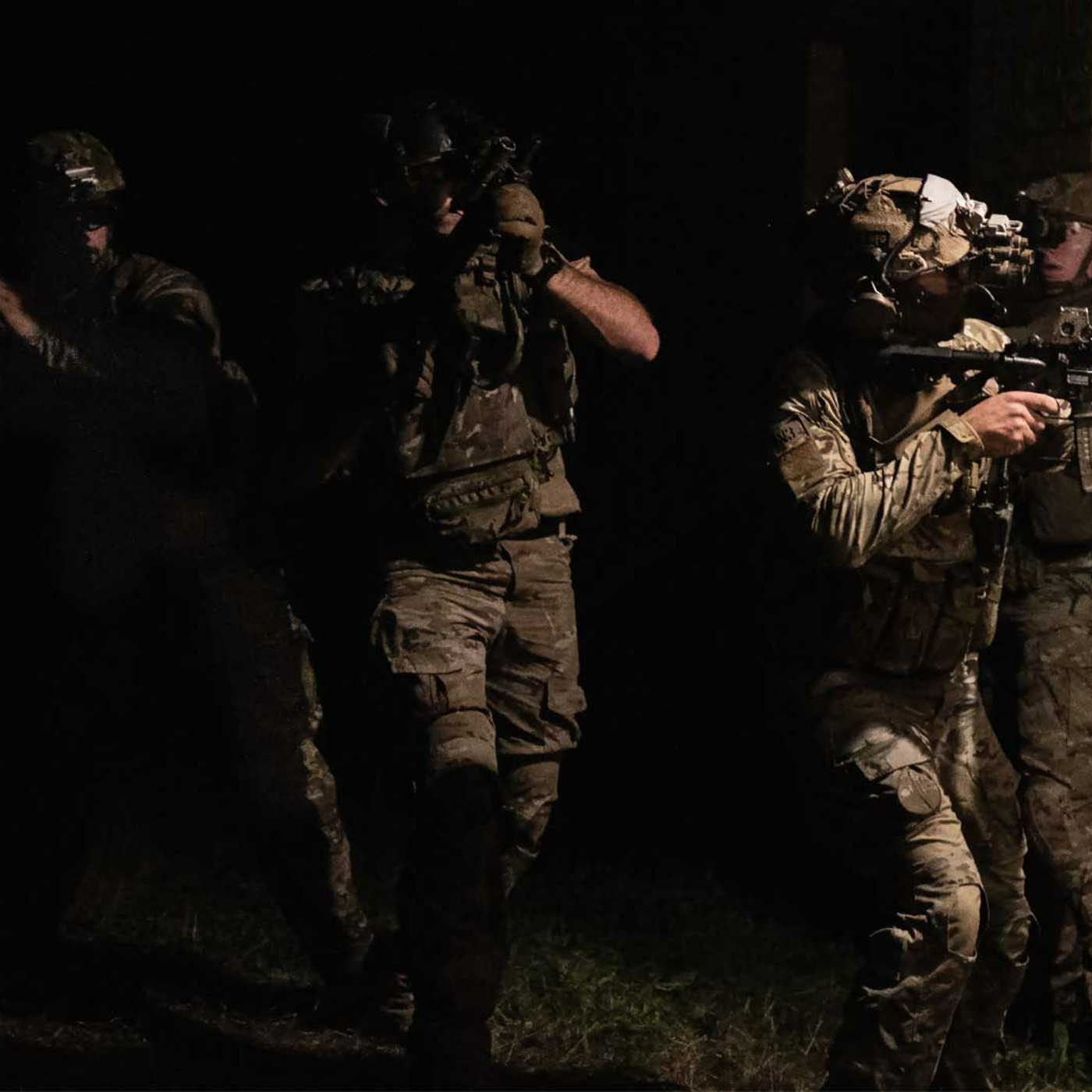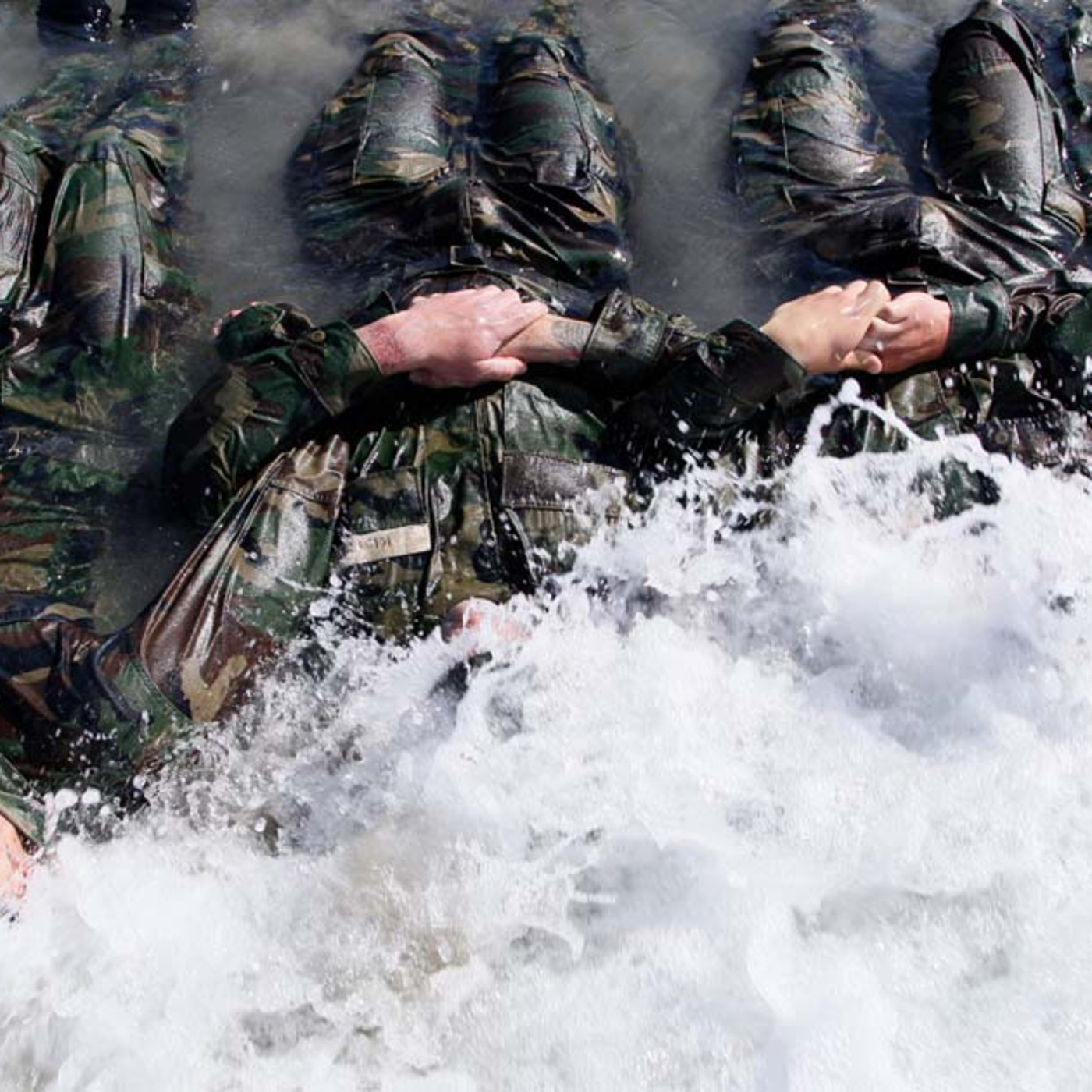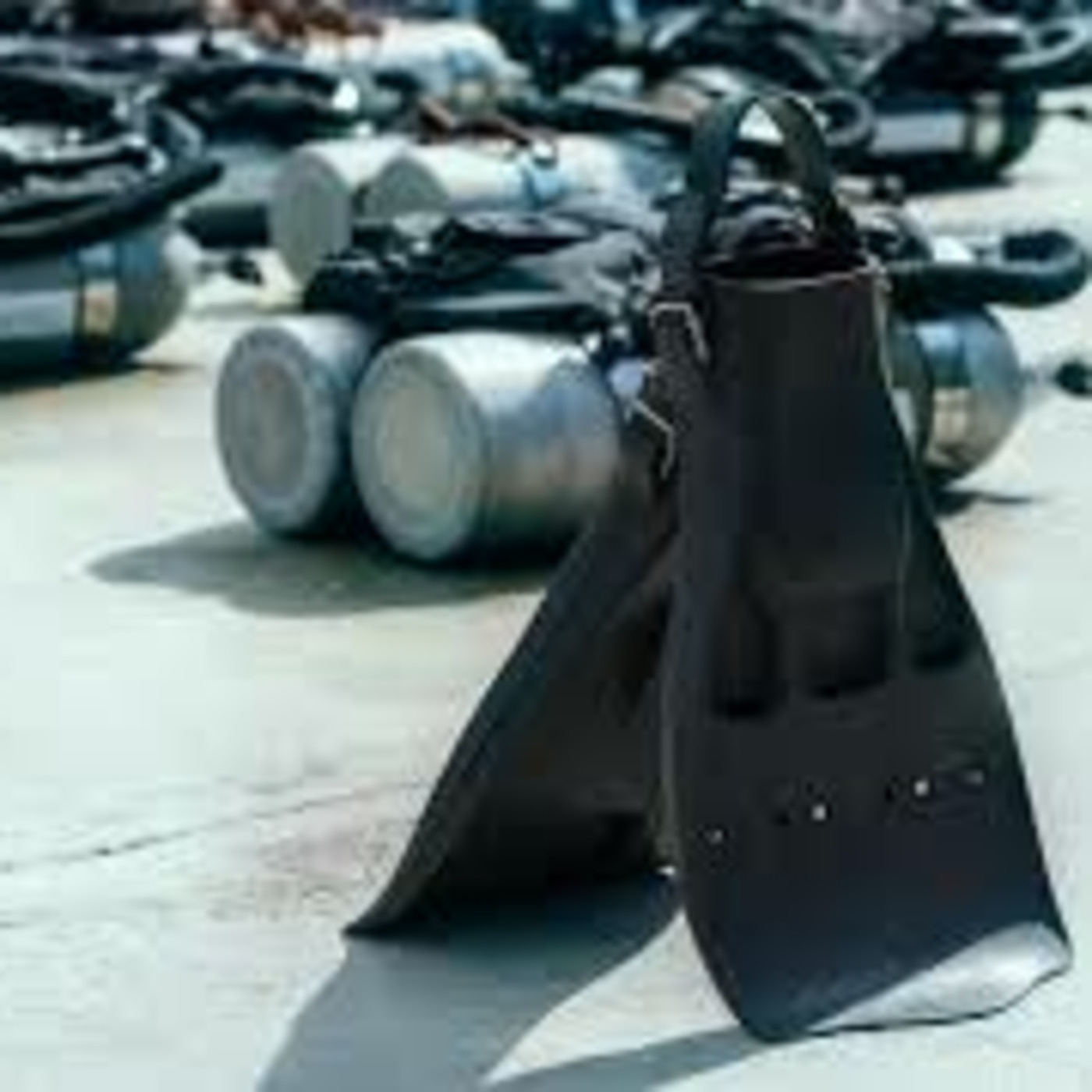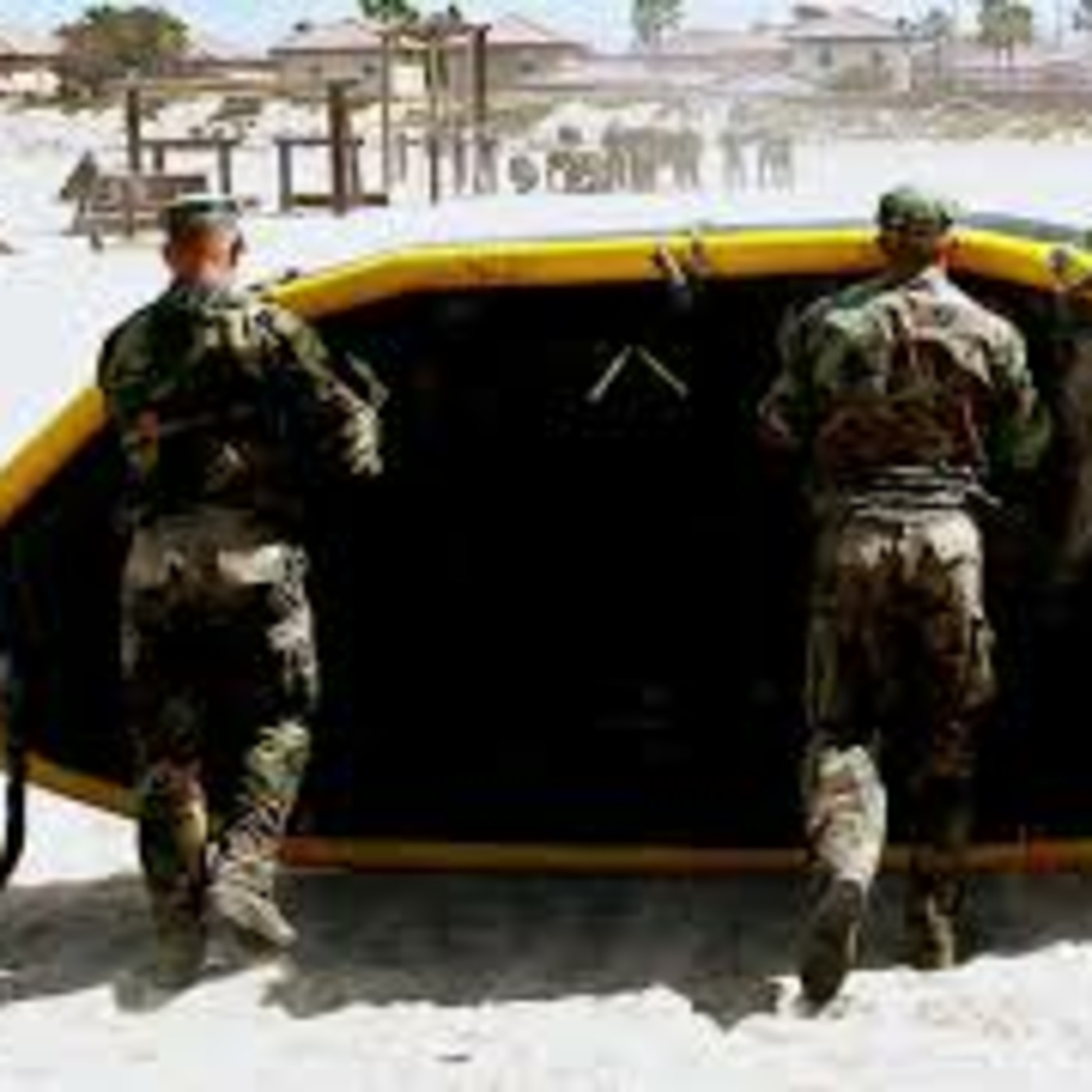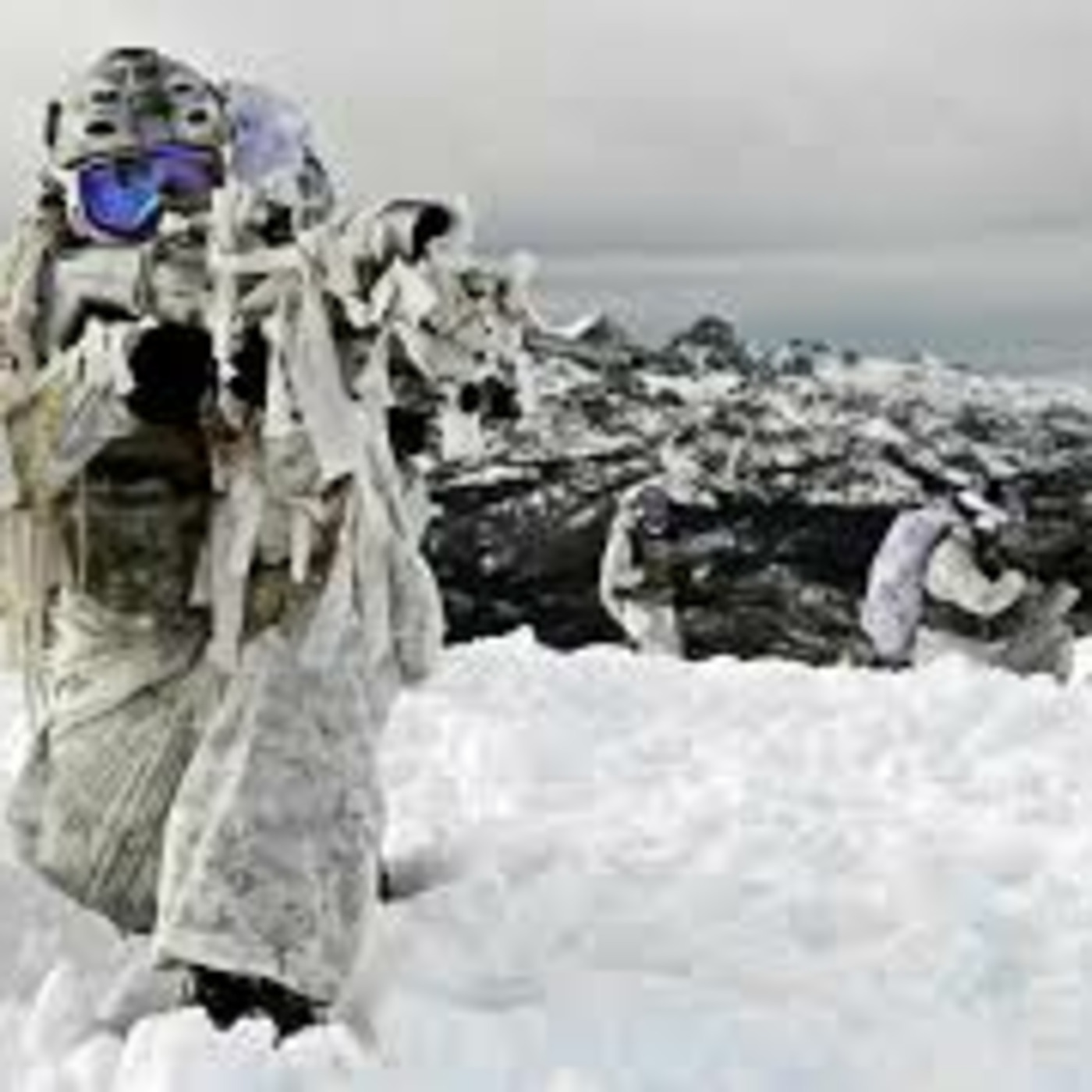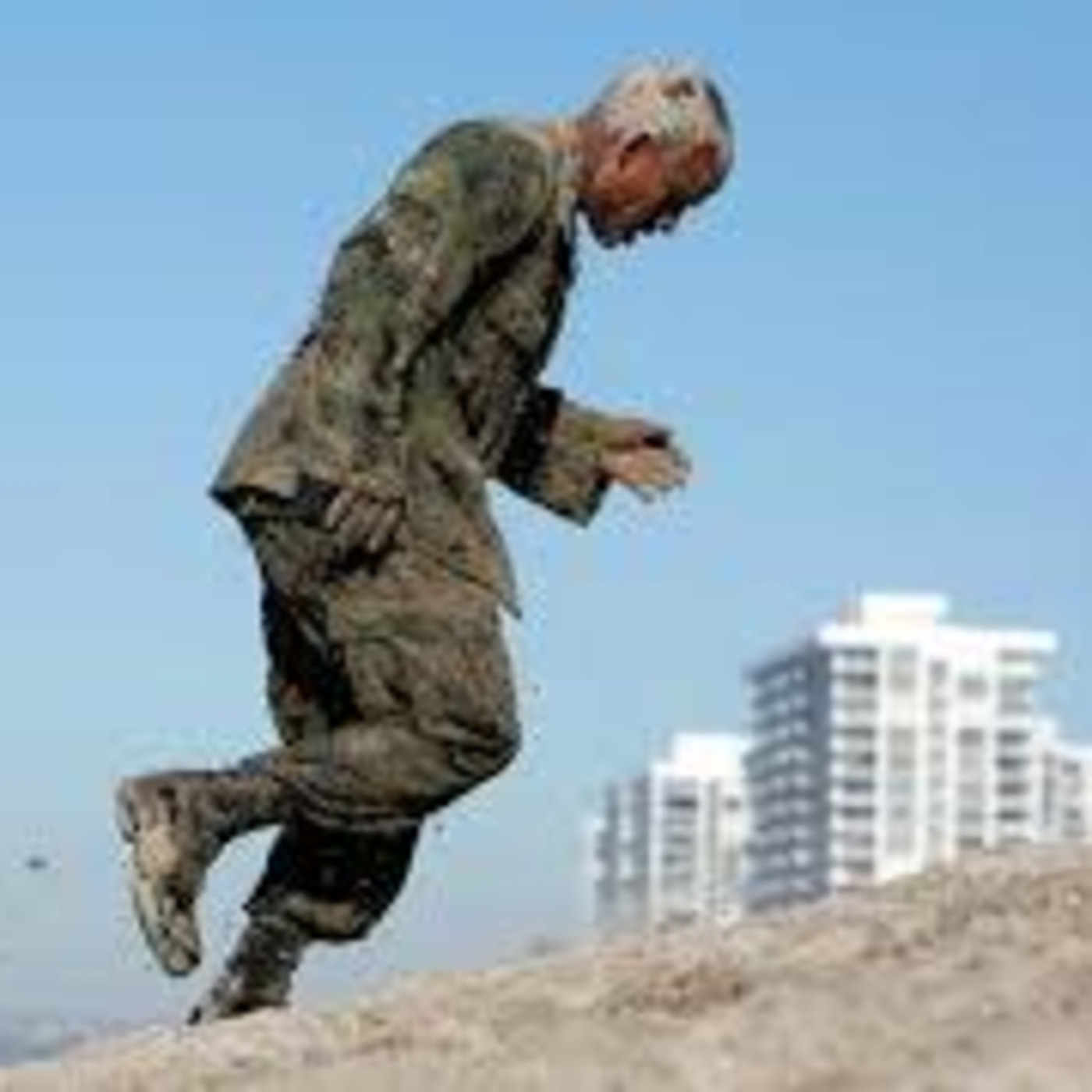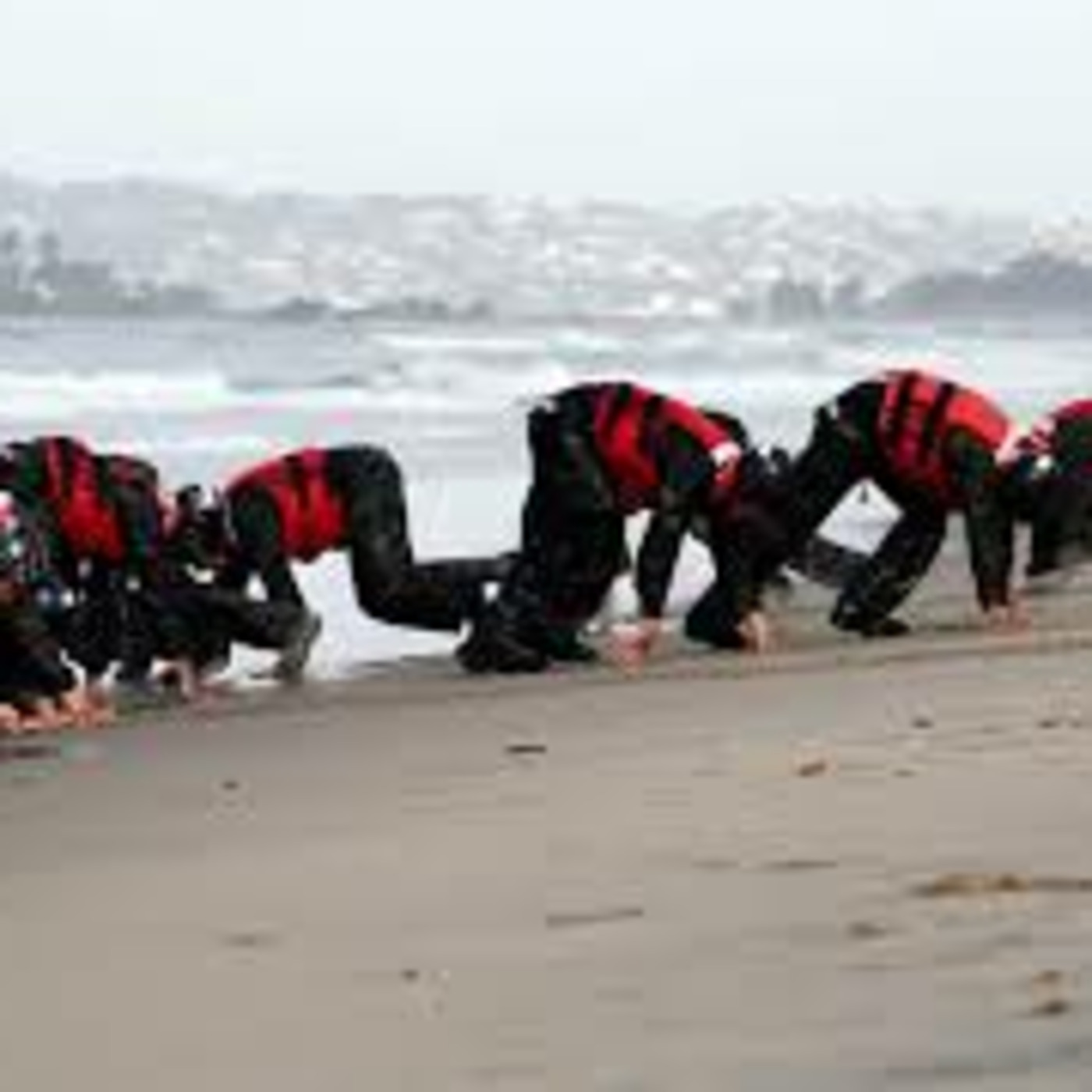Discover The Official Navy SEAL and SWCC Podcast
The Official Navy SEAL and SWCC Podcast

The Official Navy SEAL and SWCC Podcast
Author: Naval Special Warfare Podcast
Subscribed: 812Played: 14,908Subscribe
Share
© Copyright 2025 Naval Special Warfare Podcast
Description
We bring you the experts, the insiders, the real SEAL and SWCC operators that live the dream. You’ll learn the insider tips of special warfare training, fitness, motivation, mental toughness, and the application process. The Only Day Was Yesterday is the official U.S. government Navy SEAL and SWCC podcast. The Only Easy Day Was Yesterday is not only the name of our Official Navy SEAL and SWCC podcast, it’s a meme that means everything at Naval Special Warfare.
54 Episodes
Reverse
Learn more about how we choose the best of the best.This summer was marked by changes in the preliminary selection program. Tune in to find out more.
SEALs at “The Yard” tell us the ins and outs of how midshipmen earn their chance to attend SEAL Officer Assessment and Selection. First stop: the challenging Naval Academy Screener. Get ready to pull an all-nighter…
How to train and apply to become a Navy SEAL or SWCC: https://www.sealswcc.comWe spoke with a Navy SEAL about his experience as a close combat instructor and career in professional mixed martial arts. Spoiler: both occupations have something to learn from each other.NSW
How to train and apply to become a Navy SEAL or SWCC: https://www.sealswcc.comA SWCC master chief explains how he rose from the ranks of a regular seaman to earn the pin that defined his exciting life in Naval Special Warfare.#NSW; #SWCC; #Navy; #fastboats
How to train and apply to become a Navy SEAL or SWCC: https://www.sealswcc.comWe have a candid discussion with a junior SEAL officer about the Teams, the realities of training, and why he chose to put aside an easier life and become an elite warrior.
Welcome to 'The Only Easy Day Was Yesterday', the official Navy SEAL podcast. I'm your host, Scott Williams and with me today is Andrew Dow, who is a retired SEAL and runs the SEAL Officer Selection and Assessment Program at Naval Special Warfare. And also Mr. Rod Olsen, who is well, let me tell you a little bit about Mr. Rod Olson because he has quite a background. He is the CEO of Coaches of Excellence Institute and Coach O Consulting Group. Known as a "coaches coach", Mr. Rod Olson is an author of three books and a specialist on 21st century coaching and leadership following a 17-year football coaching career that included coaching positions at Oklahoma State University, and three-time national champion Appalachian State University. Rod has spent the last decade training and coaching leaders from Fortune 100 companies to the Dallas Stars of the National Hockey League, and the Texas Rangers of Major League Baseball. Currently, Rod mentors and coaches major commanders in the NSW community, which is part of what we'll talk about today, and also trains both SEAL and SWCC instructors quarterly at Naval Special Warfare. You can learn more about Rod at www.coachoconsultinggroup.org. Welcome. Mr. Olsen.
How to train and apply to become a Navy SEAL or SWCC: https://www.sealswcc.comWe dig into the mailbag and explain how SOAS works – everything from preparing for the cold ocean to (not) being the Gray Man.
Time to await fate. The trial of SOAS is over and now the SEAL candidates are chosen. Learn what goes into the process of selecting the winners.Scott (Host) Welcome to another edition of ‘The Only Easy Day Was Yesterday’. I'm your host, Scott Williams, and today we're going to be talking SOAS. We have our SOAS representative, retired SEAL Lieutenant, Andrew Dow. And Andrew we've covered this now, three times. And we've talked about how to get ready for SOAS, what to expect, how to train for SOAS, all that good stuff, and then actually seeing a SOAS live in the flesh and watching as the evolutions go down. Today, we're going to talk about the aftermath. What happens when candidates have actually attended SOAS, gone through the two weeks, and gone home, and now they're waiting? So, tell me first, what happens after those evolutions are done, from the staff perspective. Andrew (Guest) Okay. All right. So, we did talk about, you know, the whole pre-op, pre-application, we talked about assessment week, interview week, but what happens afterward is there's a SEAL panel, a SEAL Selection panel, and every applicant that attends SOAS finishes SOAS with a SOAS scorecard. Basically, it explains, and it tracks everything they've done during the SOAS both interview weekend and assessment week. So, it's their scorecard that shows how well they did on certain evolutions, instructor inputs, and peer inputs, all gets compiled, and the scorecard gets forwarded to the SEAL Selection panel. The panel happens at the end of the third block in September. There's a week-long process where several O-5s and O-6s and now this year alone, the two-star Admiral of WARCOM will be the panel president. They come together and they sit down and go through each application, their pre-application, they go through each scorecard, and they determine which applicant will receive orders to BUD/S and will receive a bill to become an 1130. Excuse me, 1180. Scott (Host) You mentioned that the flag is sitting in this time. I think it's the first time that's happened. Andrew (Guest) That's correct. Yeah. In the past, it used to be the commodore of Naval Special Warfare Center. But this year, we're moving with having the two-star sit as the panel president. Scott (Host) Yeah, I imagined as one of those potential selectees that I'd be at home sitting thinking, who is evaluating me right now? Andrew (Guest) Well as in SOAS the evaluators and the assessors are NSW instructors and regular operators that will write down everything about you everything you do, but on the actual panel, you're having senior leadership, O-5 Commanders of SEAL teams, Commanders of Basic Training Command, the Commander of Advanced Training Command, you'll have the Commodore who's an O-6, which is a Captain in the Navy, sitting at the panel who used to be the panel president but now the Naval Special Warfare Command Admiral, two star, will be leading that panel. Scott (Host) So, what are the big things they're looking for in that panel? Andrew (Guest) Right. So, it hasn't changed much in the past, except that now that Naval Special Warfare is focused more on maritime and going towards that route of operations overseas. They're looking for, either way, they're looking for the whole-person approach. They want to see candidates that have great character, great teamwork, professionalism, and leadership, and are able to work in different situations that they can adapt to. So, what's tested at SOAS and that's what's presented at the board. They're looking at their cognitive abilities, their behavioral aptitudes, they're looking at their physical performance, which is very important, their comfortability in the water, as well as they'll be tested on their leadership abilities. They'll be put in tough situations. So, the results of those situations will be presented to the board as well. So, the big three are character, cognitive ability, and physicality. Scott (Host) And, you know, we've heard of the gray man concept where, you know, you kind of sneak through BUD/S with not being the guy who's at the bottom and not the guy who's drawing attention as a star performer, but kind of blending in with the pack. How does the panel look at the gray man? Andrew (Guest) Every community has a gray man, right? But in the officer community, you can't be a gray man. They're selecting the ones that stand out, they're not selecting the ones that do poorly and it's becoming more and more the norm to not select gray men. So, if you're the type of person who's very quiet and timid, and hey, I just, I'm just doing this to get by, you shouldn't even come and apply because you're not going to get selected the bottom line, they want to see the outgoing people, the people who aren't afraid to take risks, you know, coordinated risks and calculated risks. Excuse me. The gray man, as you're talking about Scott, as officers, that really doesn't sit well with the panel they're not going to move forward with someone who is I don't want to say introverted, because obviously, you have to be outspoken you need to be able to present yourself and to your, your, your subordinates. But as a gray man, they're going to pass you by, you're probably not going to get selected, to be honest. Scott (Host) So maximum individual output, but also maximum teamwork? Andrew (Guest) I'd say teamwork and vocalization. So, they're not looking for the, you know, the cheerleader who's looking at me, look, I'm the one talking all the time, just saying whatever they want to hear. They're looking for the ones who are actually saying the things that need to be said, the ones that are actually stepping out of that comfort zone of should I say something or should I just sit back. They're looking for the ones that are like, okay, I have a plan, explaining it to their men and women that this is what we need to do. And all of this is getting documented on their SOAS scorecard. So, the panel will see this, who's a gray man, who's a good-spoken leader, who's the ones that are just there to get a, you know, a nice flare on their chip saying, hey, I made it through SOAS. Scott (Host) How do the quotas work? I mean, how many people are going to make that panel and roughly how many get selected. Andrew (Guest) So, every year, the Admiral looks at the entire force and sees how many officers will be needed to fill in those ranks that are now missing. Each year, we're looking at sending to BUD/S roughly 80 to 95 Officer candidates to go to BUD/S. From that, their hope – their intent – is to get at least 60 to 70 Officer candidates to get through the pipeline, and to later on check into the teams. The one other thing though is those numbers have been relatively the same each year. As we spoke in an earlier webinar, you know, OCS specifically for being selected for BUD/S from the selection panel, OCS, we're looking at probably 90 to 100 applications and from that, we have about 60 attend SOAS and of that 60, only about 15 are 15 to 20, I'd say because there are some alternates, that get selected to go to BUD/S. And each accession source has a different one. But strictly OCS, that's the number for there. Naval academy has their own process that they select how many get through. ROTC same thing. I can go into those numbers too, give a broad range of that so that, you know the listeners can have an idea of okay, what are what are my chances what is the percentage of me, you know, being picked up if you want. Scott (Host) Shoot. Andrew (Guest) Okay, so we have OCS. We have ROTC. ROTC, we see about 70 to 80 applications a year, of that 70 to 80, the board usually gets about 50 to look at. And of that 50 they pick about 15 to 20 to go to BUD/S. Naval Academy like I said, does their whole internal down selection to see who goes to so as themselves, but they start with as high as 250 to 300 applications, candidates and from there, they do their own little screeners, or they have two screeners a year and have that they probably send about 100. They have about 150 that come out of the screeners. From that 150, they only send about 60. So, they have a pretty intense down-selection process themselves. Of that 60 who attend SOAS, Naval Academy sends maybe 25 to 35 candidates to BUD/S. So that selection process is very... Scott (Host) rigorous. Andrew (Guest) Thank you. Yes, rigorous. We have OCS, ROTC, and Naval Academy. Then there's the other accession sources, which we don't see as many applications for, and we don't see as many selected from that inner service transfer, when you have like your Marine Corps, your Army officers, your Air Force officers that apply for SOAS and attend. We see probably about from each one of those probably about five to ten a year and the selection panel maybe picks one or two maybe. As long as they have, you know everything we're looking for and that their service is willing to let them go to cross over to the Navy. We also see Merchant Marine Academy. Scott (Host) I remember we've even in the past seen a couple of Coast Guard Officer candidates come through quite some time ago. Andrew (Guest) Since I've been working, in the seat, I've seen probably three Coast Guard and strictly enlisted. Coast Guard enlisted apply that would like to go Officer. Enlisted to Officer. So, OCS Enlisted category. Before I touch on the Coast Guard specifically, the OCS enlisted side basically, that's anyone who is active duty in service from your seamen, seamen recruit your E-3 to I've seen an E-6. Actually, an E-7 this year, we have an E-7, which is the Chief applying. That is probably the hardest road any candidate accession source has because they're competing against Trident wearers. They're competing against SEALs who are enlisted that want to become officers. So, they fall in the same pool as those at the selection panel. So, any enlisted sailor that applies for SOAS that goes to SOAS that goes to the selection panel is actually competi
It’s no picnic for SEAL Officer candidates. Hear what it’s like as we take you to the obstacle course and watch the candidates learn to overcome mental and physical challenges.
You can’t fake it to make it. We tell you how to navigate the application process and what you need on your resume.Scott Williams: Hello, everyone. Welcome to another episode of the Only Easy Day Was Yesterday. I'm your host, Scott Williams, and today we have Andrew Dow with us to discuss the topic of SOAS. This is Part 2 in our series. In the first part, we talked about what SOAS is, and Andrew explained that pretty well to us. Now we're going to talk about how to prepare for SOAS, and this is the SEAL Officer Assessment and Selection process. So, Andrew, welcome. Let's get right into it. Let's talk about the application process itself. How do I apply if I want to be a SEAL officer? How do I apply for SOAS? What are some of the dates and things that have to be done and prerequisites? Just talk to us about that. Andrew Dow: The SOAS application is very straightforward; all of it can be found on the SEAL OCM web page, and you can get to the SEAL OCM web page through SEALSWCC.COM. There are different application processes for different accession sources, so I'll first address the OCS, Officer Candidate School, or the civilians who want to become SEAL Officers. So, the SOAS application – before we even start anything, to be an officer in the military, an officer in the Navy, every candidate has to have their four-year degree. They have to have their bachelor's degree; whether you have your degree already or if you're just about to apply, you should start the summer prior to the application due date. Applications happen once a year. They're due to the SEAL OCM at the end of February, and every year it's the same. They are due to the SEAL OCM end of February. So, if you're an OCS applicant, you should start this application in the summer. So, in July or August, you go to an Officer Recruiter, start the OCS application, and work on the SOAS application. If you're NROTC and haven't let your chain of command know early, you start during the summer of your rising junior year. You start the SOAS application, and no matter what, the applications are due to the SEAL OCM end of February.Once the application for any accession source is submitted, the SEAL OCM – Officer Community Manager – conducts a ‘down-select’. This down-select determines if you'll receive an invitation to SOAS or not. This happens usually at the end of March or early April, and then from there, they'll have the list of who will be attending SOAS, and you'll be notified in early April or the middle of April if you've been invited to SOAS. After you've received your invitation, you'll attend SOAS, whether it's in June, July, or August. After you complete SOAS, there's a SEAL selection panel that happens every September, where the Naval Special Warfare senior leader will sit down with a bunch of community officers and determine who will be selected to go to BUD/S. This happens in September. Candidates will be notified if they're going to BUD/S, usually in October, and then from there it's...if you're a ROTC midshipman, that October is your senior year, so you'll finish your year, you'll graduate, you'll get commissioned then you'll go to BUD/S. For OCS, you will usually attend OCS a month after receiving the selection, so you'll probably attend OCS sometime between November and April, and then you'll go to BUD/S late spring to early summer. So, the SOAS application is...there are different accession sources for SOAS to become SEAL officers. I'm strictly going to talk first about the Officer Candidate School, the OCS candidate – the civilians who want to become SEAL Officers. Before they can even apply and become, start the SOAS application, they have to have their four-year degree, and that goes for any aspiring officer in the military. Whether you're going to become a Naval Officer or an Army Officer, you have to have your four-year degree. So, the first step they have to do is they go down to their Officer Recruiter at any Navy Naval Station in their hometown or whatever is local to them, and they go in and talk to our Officer Recruiter and say, “I want to be a SEAL Officer through the OCS pipeline.” The Officer Recruiter will then start their application process, but concurrently and independently, they have to do their SOAS application and their SEAL Officer assessment application. This application can be found on the SEAL OCM web page. If anyone has issues getting to that web page because they have just changed the format of it, it can be very confusing to navigate. They can reach out to me. I will provide my contact information to Scott so if anyone has questions on how to get there. Scott Williams Yeah, just shoot us an email at info@sealswcc.com, and we'll get that question answered. Andrew Dow Or they could go to the SEALSWCC.COM website, and there's a link to get to the SEAL OCM web page with the SOAS application. Scott Williams What does OCM stand for? Andrew Dow Officer Community Manager. The SEAL Officer Community Manager is the one who receives all the SOAS applications. So, an OCS candidate talks to their Officer Recruiter, and at the same time, they can utilize me, and I will help them with their SOAS application. So, the SOAS application for an OCS candidate starts with them going to their Officer Recruiter, the Officer Recruiter will handle different components of that application, but concurrently and independently, they're going to do their SOAS application. The SOAS application for an OCS candidate requires that they have a four-year degree, they have to have a PST score and a physical screening test score that can be done by their Officer Recruiter, who can proctor it. They have to have a resume. The resume is basically a brag sheet about the individual and what they have done prior to applying to SOAS, and this could be a wide range of things their leadership experience, their athletic background, their GPA, what majors they studied, do they speak any languages, this is the time that they get to brag about themselves, check your modesty at the door. You want to basically tell on this resume everything great about yourself. Scott Williams And is that the kind of stuff that NSW is looking for? Andrew Dow Yes, during the SOAS application, we want to see – because they're looking for individuals with athletic backgrounds – the ones with strong GPAs or are bilingual, or have leadership experience in the real world that they will be able to utilize in the SEAL community. So, one of the components of the SOAS application is that resume, so that's like I said, is your brag sheet. After you have the resume, you need your letter of references, usually get two of those, and it's given to someone who knows you and who can write about talk about you, your leadership, your character, what you have done in life up to this point and for them to basically talk about it. In the past, I've told candidates, some good people to write a letter of reference for, you know, high school coaches, high school teachers, college teachers, college coaches, and some of your mentors that you know that you've looked up to in the past. Scott Williams So, it doesn't have to be, you know, your local senator, for instance, as it would be if you're applying to the Naval Academy and yet you're getting a senator to write a letter recommendation or some Admiral somewhere it really has more to do with how well does that person know you so that they can evaluate you as someone that is well known versus…. Andrew Dow The whole point of letter references is not about the signature at the bottom. It's about the individual, the candidate. The person writing these LORs should know this person and be able to write good things about them, and just like you said, you're not looking for a senator; hey, if you know a senator and he knows you since you were born by all means, utilize that individual. Or if you know a four-star Admiral or a four-star general who knows you and your family by first name, yeah, you can utilize those, but if you're just in passing and you see this four-star who you had the chance to say hello and then you ask can you write a letter of reference for me, that's probably not a good idea because the selection penalty sees these all the time. And it's frowned upon because they don't know you. You want to find someone who knows you. That's the most important thing for these letters of reference. Along with the LORs, you have the OCD, which is the Officer Candidate Data card. It's basically a snapshot of the individual. The Officer Community manager can provide this to you, and it's basically just filling in all the important highlights of your resume, your GPA, your leadership background, and your athletic background. Also included is a headshot of the candidate. So, each candidate is also going to be required to provide a headshot in business casual. Don't be taking a picture in board shorts, and T-shirt, and flip-flops. Look professional, because this is an interview. Scott Williams So, it's kind of like a baseball card, in a way? Andrew Dow Right, right. Scott Williams It has your personal stats...Andrew Dow Yes, exactly Scott Williams ...what you look like and your major accomplishments. Andrew Dow Yeah, height and weight. It's going to say, the four-year degree you got, if you have a master's degree, it will say that. It will say what you did in college, what you did in the real world of the jobs you've held, and any languages you've spoken. Scott Williams How important is the degree or the school that you got it from? Like I get the question all the time, what should I get a degree in. Or does it matter if I go to Stanford or Timbuktu University. Tell me. Andrew Dow So that's a great question, and so my opinion on this and what I've said and seen over the last few years on applications is, your major doesn't matter. What I tell all candidates is to take a major that they enjoy. Take a major that you feel you'll do well in or any m
Introduction: Life is about constant evolution. Always better today than we were yesterday. Scott: Hello everyone and welcome to another episode of The Only Easy Day Was Yesterday. I’m your host Scott Williams and today I have with me Andrew Dow who is going to school us on the topic of, what we call around here, SOAS. What is SOAS, Andrew?Andrew: Thanks Scott. So, thanks for having me. It is always great to come by and discuss with you all. Again, my name is Andrew Dow. I am a retired SEAL Officer. I have been the SOAS, which stands for SEAL Officer Assessment and Selection, I am the program manager for this program, and I've been doing it since 2016 and it's come a long way. Scott: Yeah, tell me a little bit about when SOAS began and why it's required if you want to become a SEAL Officer?Andrew: So SOAS was instilled I think in 2014 and in 2014 is when it started building itself into what it is today. So, 2014 to 2016 was candidates from the Naval Academy, Officer Candidate School, ROTC would get an invitation to come to SOAS and basically train for 2 to 3 weeks and from that they would get some kind of score that would follow them with their application which would later determine if they become selected for SEAL Officer and in turn go to BUD/SProbably around 2017 is when we really started seeing a change in the SOAS format and inviting every accession source cause SOAS…. Well let’s just talk about SOAS first before I dive into the timeline where we are. Scott: So, what is SOAS? Andrew: The SEAL Officer Assessment Selection is designed to assess aspiring SEAL candidate officers who want to go to BUD/S and become SEAL Officers you get Naval Academy candidates. You get Naval Academy candidates. You get ROTC candidates. You get Officer Community OCS candidates. You get inter-service transfers which is your Marine Corps officers, your Army officers, to Air Force officers. You get inter-service academy transfers which is your WestPoints, your Air Force academies, Coast Guard academies. You also get lateral transfer, lateral transfers being an individual that's already active duty and is in the surface Navy. They could be... we mostly see lateral transfers being surface warfare officers that do their time in the fleet and decide hey I want to submit an application to become a SEAL officer.Scott: That could be an Intel Officer. That could be Aviation Officer, Supply Officer. Andrew: It can be. We do not see a lot of pilots or back seaters or Weapon Officers or Pilots. I haven't seen many Intel Officers come through. It’s mostly just surface warfare. Because Submariner Sub Officers, they have so much schooling they have to go through... unless they undesignated ... they won't apply. Because in order to apply for a lateral transfer you have to have your warfare insignia right, your Surface Warfare pin. If you are a pilot, you have to have your pin for you can even apply but that timeline is just so far that we only ever see SWOS. SWOS, lateral transfers and they we will also see OCS (Officer Candidate School), active-duty enlisted sailors who want to become SEAL Officers. That’s a very, and I tell a lot of candidates this, that is a very difficult course to go. And it’s one of the … the reason it’s most difficult is your competing against active-duty SEAL enlisted who want to become officers. These individuals don't have to go to SOAS, they don't have to go to BUD/S. So those individuals, it’s an uphill battle to even go to SOAS and then from there to even be selected to go to BUD/S. Scott: Talk a little bit about who has to go to SOAS, why its required. Who doesn’t have to go to SOAS?Andrew: So, guys and gals who don’t have to go to SOAS are those who are already trident wearers, those who are active duty or reserve who are SEALs already, don’t have to attend SOAS. Scott: Enlisted? Andrew: Enlisted, yes. SOAS is strictly for candidates who want to become SEAL Officers. The enlisted SEALs that apply to become SEAL officers, they submit an application like everyone else to the SEAL Officer Community Manager and then their application will go right to the selection panel in September. That is run by the Admiral, two-star Admiral, who will determine who gets the selection to BUD/S. So, everyone who goes to SOAS, who makes it through SOAS, their application and SOAS score will go to the selection panel which happens after SOAS, as well as any others that don’t have to attend SOAS -- those SEALs, and it will be determined who will go to BUD/S from there. Scott: The only enlisted applicants for SOAS are going to be trident wearers? Andrew: Yes, trident wearers. But it’s also other ratings in the Navy right. You can have your machinist’s mates, your ITs, your ETs, all of them. They do have to go to SOAS, but the SEALs do not. Another thing that may not be known is the SBs or Special (Warfare) Boat (Operator) crewman, or SWCCs, have to go to SOAS actually. Last year we had SBs that had the option to attend SOAS. We gave them the option because they have already been through BCT, they already have their warfare insignia for SWCC, but we said that it was in their best interest to go so they have a score because they are running against trident wearers who have already been through BUD/S, right. These individuals would still have to go to BUD/S. So SWCC also attended SOAS. So, any active duty enlisted from any branch right. So, in the past we’ve had Marine Corps enlisted attend SOAS. We’ve had Coast Guard enlisted attend SOAS but that’s another avenue and there is a lot more than, oh can I just apply. No, you have to get your brand of service approval before you can attend.Scott: Right because there is no interservice transfer for enlisted into the Navy unless it's with the follow on going to OCS to become an officer. Andrew: That is a very challenging core so listen to an example. You have a Marine Corps sergeant that did his or her time and wants to become a SEAL officer. They have to one get their chain of command approval from the Marines, from whatever community they are in the Marine Corps. The Marine community has to be willing to give up this individual to cross over to the Navy right. They will attend SOAS as a Marine Corps infantry man or supply corps, whatever rate (MOS) they have. They will attend SOAS as a Marine but when they graduate SOAS or when they finish SOAS and they go to selection panel, if they are chosen, they would then have to attend OCS Navy. They would then have to actually change services from Marine to Navy and then go to OCS. Then after they complete and graduate OCS they would attend BUD/S. But there are a lot of approvals that have to be done and it has to be willing of that service whether its Marine Corps, Coast Guard, Army, Air Force to allow them to go and change from their community to Navy. Scott: Yeah, I would imagine you don’t see a lot of those other service member enlisted come through more interservice transfers for at the officer level the O-1s the O-2. Andrew: No. So, in the past I’ve seen two enlisted and they were from the Marine Corps. Officers, you will get them from Army, Navy, mostly Marines Corps is the officers you see that go from their community and try to go SEALs. Army has been a little bit; I don’t think we’ve had an Army in the past. Scott: What about Coast Guard?Andrew: Coast Guard. I haven’t seen a Coast Guard Officer. There actually was one Coast Guard enlisted that came to SOAS. They weren't selected right so they would just go back to Coast Guard. But there hasn't been a Coast Guard enlisted, officer or enlisted, that's been selected to go to BUD/S through SOAS. From SOAS to the selection panel to BUD/S.Scott: Now I’m about to go down a little bit of a rabbit hole but the question occurred to me, what if you had an interservice transfer officer from let’s say the Army. An Army second lieutenant or an Army first lieutenant that comes to SOAS, goes through all of SOAS and ultimately doesn't get selected by the board. Does that officer candidate then return to the Army in their former capacity or now do they have to go to the Navy as a general army officer? Andrew: What happens if they aren’t selected, they will go back to their community. If they are selected that’s when the paperwork gets handled and then they would go from green to blue, or better term Army to Navy or Marine Corps to Navy. That happens after they're selected so if they're not selected, they will just go back to their unit and continue on with their career in that service they are currently in. Scott: Ok. So, let’s talk a little bit about when and where SOAS is conducted. Is this an annual thing? Is it a season? What is it?Andrew: So SOAS happens during the summer. SOAS is broken down into 3 blocks, each block is 2 weeks long. SOAS blocks are usually 2 weeks in June, 2 weeks in July and 2 weeks in August. We see candidates come from all over the U.S., from every accession source and they come and attend SOAS in Coronado, California at NAB, Naval Amphibious Base Coronado. And they’ll be doing SOAS where BUD/S is held. They’ll see BUD/S students running around, they will be doing evolutions very similar to BUD/S, but it happens in Coronado three times a year: 2 weeks during June, July, and August. They will attend. So, it happens annually. Scott: Can you give me just a brief overview without getting too far into the details about the SOAS training schedule. Like what happens in that first week and what happens in that second week?Andrew: Ok. SOAS is 2 weeks long. First week is assessment week. Second week is interview week. Candidates will show up on a Saturday, get their gear issues, check in and fill out any paperwork that is needed for them to attend SOAS. They will go to bed and wake up. The first evolution that they are going to see is a PST. Scott: So, they are really testing right out of the gate?Andrew: Yeah, and in the past, we did the PST as the first evolution but something that we are
SEAL/SWCC Podcast 2022 Episode 42 Title: How do I become a SEAL Officer? Subtitle: The How-To guide for candidates Description: We dive into the mailbag and answer your questions about SEAL Officer programs with our guest, Andrew Dow. (Host) Scott: Welcome to The Only Easy Day Was Yesterday, the official Navy SEAL and SWCC podcast. I'm Scott Williams, your host, and today we have with us, Andrew Dow, who's a retired SEAL, and also our officer programs expert. And we thought, well, today we’d just take a look inside the mailbag. We get a lot of questions about officer accession programs, and in particular, about what we call SOAS which is the SEAL Officer Accession and Selection. And maybe Andrew, you can just start by giving us kind of a synopsis of what SOAS is. (Guest) Andrew: Sure, well, first of all, thanks for having me again, guys. SOAS, the SEAL Officer Assessment and Selection, was developed in 2014 and it has now become an official program for the Navy, prerequisite for BUD/S, Basic Underwater Demolition SEALS. It's a two-week long course where we assess officer candidates, whether they're coming from the Naval Academy, ROTC, OCS candidates, lateral transfers, some candidates from the big Navy active duty. It’s a two-week course of instruction during the summer where we will assess specifically four attributes that we're looking at: one being their cognitive abilities, their character, which is a real important one, their leadership and their ‘team-ability’. That's what we're looking at with those four main attributes. They will go through a week of physical and mental assessment evolutions, where we will be testing them through their physical capabilities, as well as presenting them with some mental challenges that they'll be faced with. One being, it could be, you know, some evolutions they'll see as similar to what they'll see in BUD/S more, it's log PT, or boats on their heads. But they'll also be introduced to new types of evolutions that specifically are assessed there, those four big traits. And then the second week being interview week, where they will sit down with an officer and a senior enlisted SEAL in the community, and they will sit down – and note it's a business interview, where there will be asked questions and regarding the community, regarding where they stand and how they were raised, challenges they faced, and to get a good idea of what the individual, who the individual is. And all this gets thrown together and goes to the selection panel, which happens after SOAS. Scott: And just to be clear, this is not for enlisted candidates; it's for officer candidates only. And when does SOAS occur during the assessment pathway? Andrew: SOAS happens during the summer, and it happens, like I said, two weeks, in June, two weeks in July, two weeks in August, and this happens after applications have been submitted to the SEAL Officer Community Manager. And correct, like you said, it's only for SEAL officer candidates; the enlisted side is completely separate. Those applications are due in February to the SEAL OCM, and from there it's a – they find out if they receive an invitation to SOAS, they complete SOAS, then the SEAL selection panel, which is a panel of O-5 and O-6 SEAL officers that determines who will receive orders to BUD/S. After that, pretty much a month, two months after that, depending on which accession source, you will head off to BUD/S. Scott: Okay, so it's definitely pre BUD/S. Andrew: Yes. Scott: And it's after the application piece. You get a notification; if you're invited you come here during the summer, and then you get notified if you're going to attend BUD/S. And that notification usually comes when? Andrew: So, selection panel is in September. Most candidates, specifically OCS, will be notified late October. ROTC and Naval Academy, since they're rising seniors, they won't find out until about December timeframe, because they won't actually go to BUD/S until the summer of graduation. But OCS candidates can leave anytime between November to April, where they would first have to attend OCS in Newport, Rhode Island, for 12 weeks and then a month after that they will report to BUD/S. So, they could get to BUD/S as early as January-February after the selection panel and be at BUD/S getting after it. Scott: So, we're talking about a good year, year and a half process from deadline of application to actually showing up for BUD/S, if you're selected. Andrew: Easily, yeah. Most candidates, it's about a two-year cycle. OCS, it's a little sooner because they already have their degree, right? To become a Naval Officer or any officer, you have to have at least a four-year degree to earn your commission. So, it's usually about two years. Scott: So, much longer timeline than a guy going for an enlisted contract? Andrew: Absolutely. Scott: Good. I mean, (an enlisted candidate) may even show up a month after he gets a contract, but usually more like three to six months, but way longer for officer candidates. So, this is why it's good to apply when you're in your junior year? Andrew: Yes. Great question. Most candidates I start trying to reach out to them their freshman, sophomore year in college, just so they have an idea and so they have all their answers before they actually submit an application. So they can, you know, start building their resume. But usually, candidates start their application, whether it's ROTC or Naval Academy, their junior year. Scott: OCS candidates usually are either graduated already, or about to graduate that May, so they'll start their application usually August for a February deadline. Okay, so we have a lot of questions that people out there have sent to us and by the way, but before we get into those, I'll just say if you have questions about SOAS, about SEAL officer programs in general, or whether you have questions about the SEAL community, even if you want to be enlisted, or the SWCC community, if you want to be an enlisted SWCC – Andrew, how can they get a hold of us? Andrew: Well, for the SEAL Officer side, they can just go to Google, sealswcc.com is a great resource to find all things – SEAL Officer requirements, as well as the enlisted side for both SEAL and SWCC. But my contact information is there on that website. That's probably the easiest way to find out more about it. And from there, I can get you on the SEAL email distro, which is an opportunity for aspiring SEAL candidates to come together. And I send announcements out regarding upcoming events, specifically for SEAL officers. So, it's a good resource to have, just going to sealswcc.com is where you start. Scott: Right, sealswcc.com is our home website. It's where all the information is, where you can find out about training, about accession and a lot of other things about the community and our general email there, which actually comes to me and so I can send things over to Andrew or whoever I need to, to get answers. It is info@sealswcc.com for all your questions. So, we're gonna do a few today. We have so many here, we'll probably schedule you for another session and we'll answer some more, but all of these questions that we're about to cover are about SOAS, so I'm going to kind of randomly throw some of these out of here, reach into my mailbag - okay, I totally faked that - and we're going to have some questions. So, all right, how about this one? “Will knowing a second language help with my SOAS package? If so, what languages should I learn?” Andrew: Alright, so languages in general is a good quality of good capability to have when you're looking into the SEAL community. SF (Special Forces) requires all their operators to learn a language. The SEAL community does not, but it's always a good tool to have when it comes down to it – specifically for the SOAS application it is not a requirement. It's a nice to have specifically languages that SEALs are operating in. You can just check out the news where their major conflicts going on, those areas and the regions that there could potentially be presence, military presence, are good spots to start learning what language you could potentially learn. However, it is not going to get you to SOAS. It's a good thing to have, it's a nice resume booster, but it is not the thing that is a requirement. Scott: Could it separate you from the pack? Andrew: It can, and you know from experience guys and gals that speak a language are more in tune to learn another language, you know, they can learn multiple languages and that can be very, very powerful tool within the community being able to speak multiple languages. I think having a good understanding, not just a basic understanding but working knowledge of this language of a specific language, will definitely help you in the end but I mean, this is just such a small part before going to SEALs, before going to BUD/S, before going into SOAS. I mean it's good to have, but it's not necessary. However, it doesn't hurt. So, languages like, you know, the big ones most people take if they're doing any type of major is whether it's Spanish, French, German. But obviously some of the big ones were no longer in Iraq and Afghanistan. So, the Arabic language and other dialects isn't as ... Scott: .... not quite as immediate use as it used to be, right? Andrew: Right, but I mean, being able to speak any of those languages is what puts you above everyone else and it will definitely jump out on the application, and seeing that you can speak any of those dialects. Scott: Well, considering that we have SEALs and SWCC in more than 100 countries around the world, there's plenty to choose from. I guess we would strongly encourage English. Andrew: I would hope so. That's an important language. Yeah. Scott: Portuguese, you know? You got to think about where we could possibly be in the world, right? So French and Spanish are widely spoken languages around the world; Dutch, Portuguese, Chinese, Russian – you kn
By: Naval Special Warfare Learn about SEAL or SWCC training: https://www.sealswcc.com Swimming is an essential skill for Naval Special Warfare operators, both SEAL and SWCC. We spoke with a BUD/S instructor who teaches SEAL candidates how to become proficient in basic and advanced techniques.
By: Naval Special Warfare Learn about SEAL or SWCC training: https://www.sealswcc.com How do you get your cardio workout if you can't go outside? Our fitness team explores the options in our latest podcast episode.
By: Naval Special Warfare Learn about SEAL or SWCC training: https://www.sealswcc.comSome like it HOT and some do NOT. Whether you are training in the desert, the mountains, the icy tundra or somewhere in between, it takes forethought and planning to do it right. Listen as our expert explains what to do.
By: Naval Special Warfare Learn about SEAL or SWCC training: https://www.sealswcc.com Job, school, family life or personal time…who has time to train? Our expert explains how to make the time.
By: Naval Special Warfare Learn about SEAL or SWCC training: https://www.sealswcc.com It’s easy to admire a big chest and arms, but these often-neglected muscle groups are critical to getting you through NSW training.
By: Naval Special Warfare Learn about SEAL or SWCC training: https://www.sealswcc.comRun in boots? Run barefoot? Our Fitness 2020 series continues with a focus on how to select the best shoe for run training.
By: HTTPS://WWW.SEALSWCC.COM the Official SEAL and SWCC website of the U.S. Government.Fitness trends come and go, but Naval Special Warfare training is Old School. Is your new fitness program helping or hampering your future?
By: HTTPS://WWW.SEALSWCC.COM the Official SEAL and SWCC website of the U.S. Government.Too fat? Too thin? Who knows? We do! Our performance dietician tells us how to get your body right for special warfare training.


